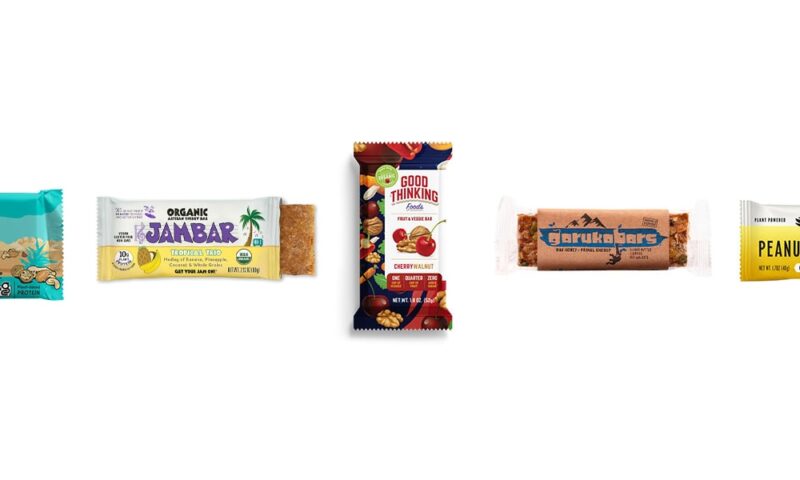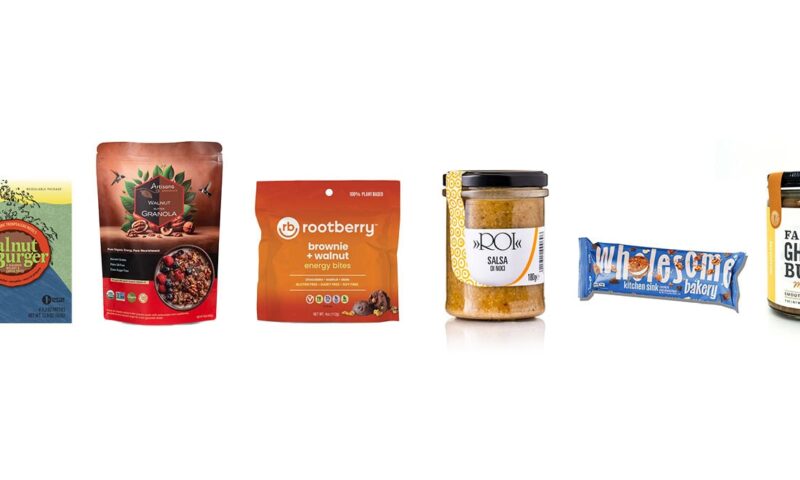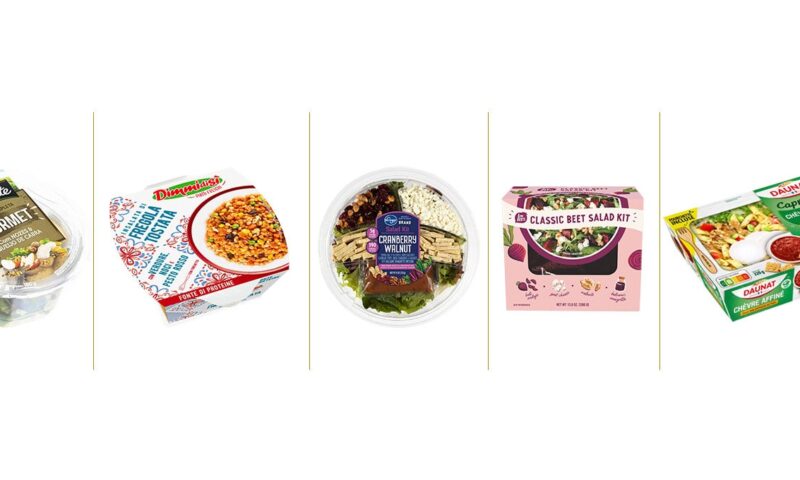Plant-based food and beverages are booming and show no signs of slowing. Product development from food and beverage manufacturers has been rapid, and consumers in all demographics are choosing more plant-based diets, either going vegetarian or flexitarian.
The trend toward more plant-based eating has gained strong momentum due to the varied reasons why consumers are choosing to eat more plants and less meat. Some consumers perceive a plant-based diet as healthier, while others are concerned with the ethical treatment of animals. Consumers even have an eye on the sustainability of the food supply when choosing a more plant-forward diet. Regardless of the reason, consumers are scanning supermarket shelves for plant-based options and food manufacturers are clamoring for space on those shelves.
The Next Generation of Plant-Based Foods
When developing the next generation of plant-based foods, product developers must evolve their formulations to appeal to flavor and texture as well as ingredient listings. Now that the initial buzz around plant-based foods has subsided, consumers are starting to pay attention to the ingredients in new plant-based products.
Questionable ingredients included in long, hard-to-pronounce listings on product labels are being replaced with cleaner, more functional offerings. In fact, ADM’s OutsideVoice Protein Perception & Awareness Study showed 60% of consumers say recognizable ingredients influence their purchase decisions, while 66% look for labels with the shortest ingredient list.
How do you make a plant-based product taste great and still maintain a clean label? Use walnuts. This popular nut is the ideal ingredient to mimic meat in taco crumbles or provide a nutty taste to a non-dairy creamer. In fact, walnuts are currently being used in some of the most innovative plant-based products on the market. When formulating your next plant-based products, keep in mind these trends and how walnuts can be used to provide flavor, function and a clean ingredient listing.
Trending: Functional Plant-Based Ingredients
DuPont Nutrition & Health conducted a study that found 52% of U.S. consumers are eating more plant-based foods because it makes them feel healthier. Walnuts provide unique nutritional value, as they are the only tree nut with a significant source of essential plant-based omega-3 ALA, with 2.5 grams per ounce. When used in plant-based alternatives, such as walnut butters or walnut milk, food manufacturers can promote the ALA omega-3 fatty acid content of a product and distinguish it from other products on the market.
One such walnut milk example comes from Elmhurst, a plant-based nut milk creator that brings us a shelf-stable walnut milk that needs no refrigeration until opened. This milk can blend nicely with smoothies, in iced coffee or cereal, and it contains 1400 mg of omega-3 ALA per serving. It is dairy-, gluten- and carrageenan-free, with no artificial flavors or added gums or emulsifiers.
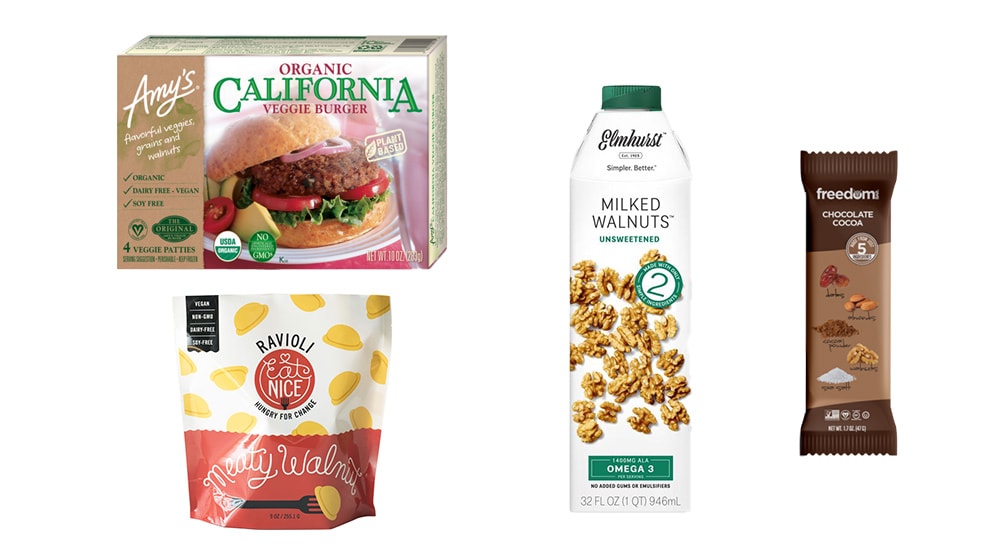
Trending: Plant-Based Proteins
A HealthFocus study showed that 60% of consumers are reducing consumption of animal protein products, and more than half — 55% — said that the change to a plant-based protein diet is permanent. It’s never been easier to substitute a hamburger patty or taco meat with a plant-based option, but the marketplace is getting crowded and many of the products are starting to look similar.
Walnuts can be used as a plant-based protein to distinguish a product while delivering a savory flavor and meat-like texture. Amy’s Kitchen made-with-walnuts California Veggie Burger is a plant-based patty that is dairy-free and soy-free. Amy’s says that the search for the “perfect” veggie burger was one of trial and error, recipe after recipe, until this one took shape. Toasted walnuts are mixed with mushrooms, onions, celery, carrots, oats, garlic and potatoes. For consumers looking for that protein and fiber boost, one patty contains 6 grams of protein and 4 grams of dietary fiber.
Eat Nice Foods produces a Meaty Walnut ravioli that uses walnuts and sun dried tomatoes for a “meaty” bite and taste. Vegan Essentials called this product luxurious and decadent, and said it will “rock your world, especially in a creamy or cheesy-style sauce.” Each 9 oz. bag of frozen ravioli is ready in only 7-10 minutes, and along with walnuts, ingredients include garlic, olive oil and sun dried tomatoes.
Trending: Plant-Based Bars
Indulging in a bar for breakfast, a snack or an energy boost during the day doesn’t have to come at a calorie-laden cost. With more nutritious offerings than ever before, walnut-containing bars hitting the market are filled with better-for-you ingredients, good fats, protein and energy boosting carbs. Bars in particular draw consumers in because they are portable, convenient and provide a variety of flavors for just about every consumer.
Freedom Bar’s Chocolate Cocoa variety is a gluten-, dairy- and soy free food bar that only contains five ingredients shown clearly on the front packaging: walnuts, dates, almonds, cocoa powder and sea salt.
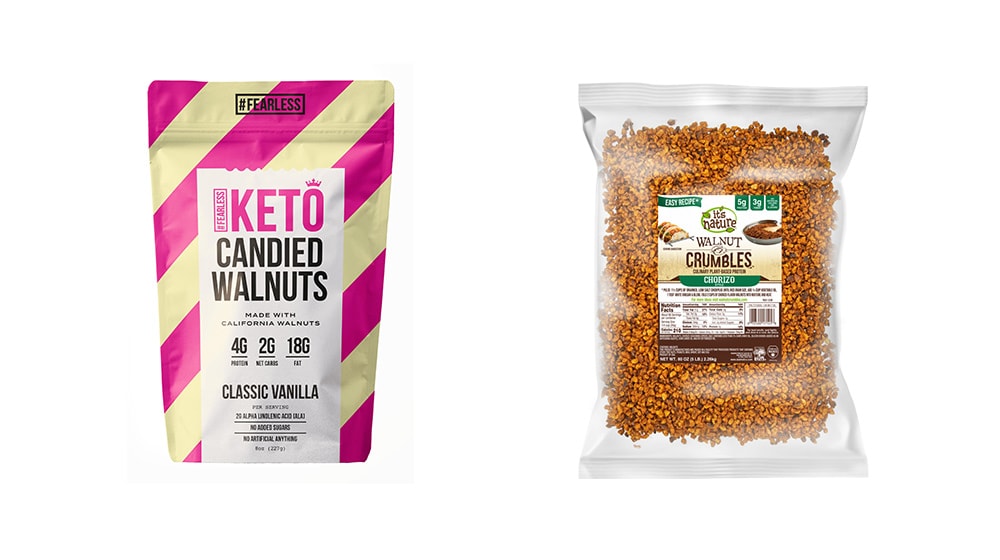
Trending: Plant-Based Sweet Treats
In a Davis Sensory Institute taste test, 14 different sweet, savory and spicy flavors were paired with California Walnuts. Sweet pairings took three out of the top five spots: dark chocolate, vanilla and sea salt caramel. Beyond flavor, the versatility of walnuts in confectionary products — from half pieces, to crunchy bites to walnuts coated in chocolate or caramel — make for great inroads to innovation. Walnuts can be enrobed in chocolate, coated with candied items or studded in fudge. Further, they provide a fresh crunch that’s an added bonus to a sweet and savory flavor profile combination.
Fearless Keto has added to its made-with-walnuts line in its latest release: Classic Vanilla Candied Walnuts. This confection only has two grams of net carbs, four grams of protein and two grams of fiber per service. This variety can be used as an ice cream topper, on a salad or eaten straight out of the package for a fun snack.
Trending: Flavor and Texture
The explosion of plant-based offerings on shelves can be overwhelming for consumers. Long-term success and repeat purchases will most likely come down to taste, texture and what’s in the product. “While consumers are drawn to plant-based proteins for their nutritional benefits, they won’t fully incorporate products into their repertoires if they don’t deliver on taste and texture,” Food Navigator reported.
Walnuts satisfy both flavor and texture demands and are popping up in delicious “chorizo” tacos as replacements to ground beef, in burgers and in bowls. Walnut veggie shepherd’s pie, walnuts topped on pizza and plant-based walnut crumbles also have been making their mark.
Azar’s Walnut Crumbles include walnuts, chorizo seasoning and sunflower oil to create a plant-based version of taco meat that can be used in tacos, burritos or on top of nachos. Change the spices to Italian seasonings and you have a product that can go on pizza or in lasagna.
The Future of Plant-Based Foods
Food Dive reports that investors have infused more than $16 billion into U.S. plant-based and cell-based meat companies in the past 10 years. Projected growth of plant-based protein and meat alternatives is predicted to increase from $4.6 billion in 2018 to $85 billion in 2030.
Choosing the product development winners and losers in the space will come down to flavor, texture and real ingredient listing. These are all areas in which walnuts excel. For more information on the benefits of including walnuts in plant-based foods, contact kseiz@walnuts.org.

